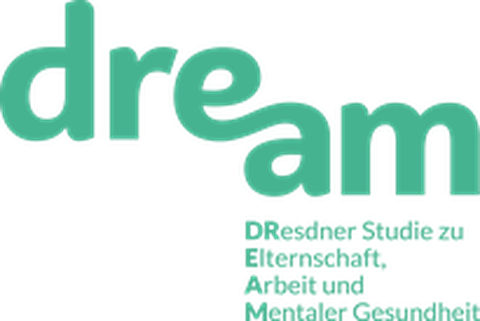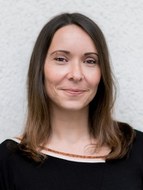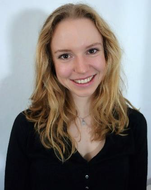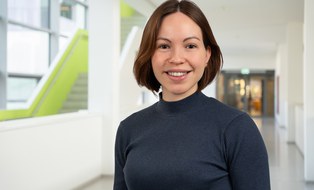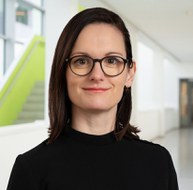DREAM - DResdner Studie zu Elternschaft, Arbeit und Mentaler Gesundheit
Inhaltsverzeichnis
DREAM
Die Vereinbarkeit von Familie und Beruf ist für viele Eltern eine besondere Herausforderung. Zahlreiche strukturelle und kulturelle Einflüsse wie beispielsweise das deutsche Steuersystem, das Elterngeld und die Verfügbarkeit von Kindertagesstätten haben Einfluss auf diesen Prozess sowie die Rollenverteilung zwischen Mutter und Vater. Zunehmend prekäre Arbeitsverhältnisse und berufliches Pendeln sind als belastende Faktoren ebenfalls nicht zu vernachlässigen. Die Rolle der Erwerbstätigkeit und der Arbeitsbedingungen für die psychische und somatische Gesundheit der zukünftigen Eltern und Familien ist in Deutschland jedoch so gut wie nicht beforscht!
Ziel unserer Studie „DREAM“ (DResdner Studie zu Elternschaft, Arbeit und Mentaler Gesundheit) ist es daher, die Beziehung zwischen Elternschaft, Beruf und Gesundheit der gesamten Familie vorausschauend zu betrachten und mögliche Zusammenhänge zu ermitteln. Wir wollen z. B. untersuchen, wie sich die elterliche Berufstätigkeit und die Rollenverteilung im Langzeitverlauf verändern und wie sie sich auf die Gesundheit und die Beziehungen innerhalb der Familie auswirken. Außerdem interessiert uns im Verlauf der Studie verstärkt die soziale, motorische und kognitive Entwicklung der Kinder. Nach der ersten erfolgreichen Verlängerung DREAMon wird nun auch die zweite Verlängerung DREAMup von der Deutschen Forschungsgemeinschaft (DFG) gefördert. Um die sich wandelnden Lebens- und Arbeitswelten der Teilnehmenden abbilden zu können, werden auch neue Fragebögen herangezogen. So wird aktuell eine Mental Labor Skala entwickelt. Dieser Fragebogen hilft bei der Untersuchung all jener kognitiven und planerischen Aufgaben, die für die Organisation der familiären Sorgearbeit nötig sind, ihrer Verteilung innerhalb einer Familie und ihrer Auswirkungen auf die Gesundheit.
Für die Studie wurden Schwangere und/oder deren Partner:innen aus dem Raum Dresden rekrutiert. Über einen Zeitraum von bislang ca. 7,5 Jahren werden die Teilnehmenden zu Arbeitsbeteiligung und -bedingungen, Haus- und Erziehungsarbeit sowie beziehungs- und gesundheitsbezogenen Faktoren befragt. Der erste Fragebogen wurde noch in der Schwangerschaft ausgefüllt, die weiteren Fragebögen nach der Geburt (T2: 8 Wochen postpartal, T3: 14 Monate pp., T4: 2 Jahre pp., T5: 3 Jahre pp.). Aktuell werden der sechste (T6: 4,5 Jahre pp.) und siebte (T7: 7,5 Jahre pp.) Messzeitpunkt realisiert. Die DREAM-Studie zeichnet sich durch die langfristige Begleitung der Familien aus.
Im Rahmen der Teilstudien von DREAM möchten wir das konkrete Zusammenwirken psychischer, sozialer und biologischer Aspekte unseres Befindens genauer betrachten und verstehen. Neben der Erhebung von Fragebogendaten erfassen wir bei einigen Familien zusätzlich biologische Stressmarker – wie etwa Stresshormone aus Haarproben (Teilstudie „DREAMHAIR“) und/oder aus Speichelproben – sowie epigenetischen Faktoren in Speichelproben (Teilstudie „DREAMEPI“). Außerdem wurden manche Paare in persönlichen Interviews zu ihrer familiären Situation und Aufgabenverteilung befragt (Teilstudie „DREAMTALK“). Darüber hinaus haben wir 2020 die Einflüsse und Auswirkungen der COVID-19 Pandemie auf Familien mit jungen Kindern erhoben (Teilstudien „DREAMCORONA” und DREAMCORONA-TALK“).
Neuigkeiten zu Veröffentlichungen, Verlosungen und weiteren Aktivitäten des DREAM-Teams finden Sie auf unserem Instagram-Account, unserer Facebookseite der DREAM-Studie oder unter unserem LinkedIn.
Neben dem bereits veröffentlichten Studienprotokoll, finden Sie hier weitere Publikationen zu DREAM und anderen Themen des Fachbereichs Public Mental Health.
DREAMHAIR
In dieser Teilstudie interessiert uns, wie das Stresshormonsystem unseres Körpers auf die besonderen Herausforderungen in der Schwangerschaft und der Zeit nach der Geburt reagiert und welche Konsequenzen dies für das Wohlbefinden der Familienmitglieder hat. Dabei kommen Haaranalysen als eine innovative Methode zur Messung der langfristigen Stresshormonausschüttung (z. B. Cortisol) zum Einsatz. Cortisol ist ein wichtiges körpereigenes Stresshormon, das uns die Anpassung an Stresssituationen erlaubt. Es wird u. a. ins Haar eingebaut und wächst dort nur langsam heraus. Erste Studien weisen darauf hin, dass dieser Prozess schon im Mutterleib stattfindet, d. h. eine Stressbelastung der Mutter wird vermutlich im Haarcortisol des Kindes reflektiert, noch bevor dieses selbst äußeren Einflussfaktoren ausgesetzt ist.
Ziel von DREAMHAIR ist es deshalb zu analysieren, wie hoch die Konzentration verschiedener Stresshormone im Haar von Mutter, Vater und Kind zu den ersten vier sowie dem sechsten DREAM-Messzeitpunkten ist und welche äußeren Faktoren einen Einfluss auf diese Konzentration haben. Dies könnte es zukünftig ermöglichen, familiäre Belastungsfaktoren zu objektivieren und präventive Maßnahmen abzuleiten, die besser auf die Bedürfnisse junger Familien abgestimmt sind.
DREAMEPI
Die Teilstudie DREAMEPI beschäftigt sich mit dem kindlichen Epigenom. In unseren Genen (auf Ebene unseres Erbguts, der sogenannten DNA) ist der gesamte „Bauplan“ für unseren Körper gespeichert. Ob und in welcher Form diese Informationen abgelesen werden, hängt u. a. von sogenannten epigenetischen Mechanismen ab, welche Gene „stumm schalten“ oder aktivieren können. Neuere Forschungsergebnisse zeigen, dass verschiedene Umwelteinflüsse während der Zeit im Mutterleib und kurz nach der Geburt einen Einfluss auf das Epigenom haben können. Aus diesem Grund soll in der Teilstudie DREAMEPI untersucht werden, inwiefern allgemeines sowie arbeitsbezogenes Stresserleben der Eltern vor und nach der Geburt mit kindlichen epigenetischen Veränderungen im Zusammenhang stehen und inwiefern diese die Gesundheit der Kinder beeinflussen.
Dazu nehmen Sorgeberechtigte aus DREAM mit ihrem ca. 4,5-jährigen Kind an einer einmaligen Testung in unserem Studienlabor teil. Hierbei ermöglicht die Entnahme einer Speichelprobe der Kinder die Erfassung von Veränderungen im Epigenom. Weiterhin werden Speichelproben sowie Haarproben zur Bestimmung stressassoziierter Biomarker (z. B. Cortisol) entnommen und Fragebögen zu psychischen Symptomen und der allgemeinen Gesundheit ausgefüllt.
Das Ziel der DFG-geförderten Teilstudie DREAMEPI ist es, die molekularen Wege, die den fötalen Ursprüngen von Gesundheit und Krankheit zugrunde liegen, besser zu verstehen, mit dem langfristigen Ziel, auf dieser Basis evidenzbasierte Präventionsstrategien zu entwickeln.
DREAMTALK
Es gibt verschiedene Möglichkeiten, die Aufgaben Beruf, Kinderbetreuung und Haushalt unter den Eltern aufzuteilen. Eine Möglichkeit ist das 50/50-Familienmodell. Das bedeutet, dass beide Elternteile gleich viel in diesen drei Bereichen übernehmen. Paare, die sich die Aufgaben Beruf und Haushalt vor der Geburt eines Kindes 50/50 geteilt haben, finden es nach der Geburt des Kindes oft herausfordernd, dieses Modell aufrechtzuerhalten, selbst wenn sie das gerne möchten. Viele nehmen wieder traditionellere Rollen ein. Somit stellen Paare, die ein 50/50-Familienmodell implementieren, eine Minderheit dar. Diese Paare haben wir in der Teilstudie DREAMTALK im Rahmen qualitativer Interviews befragt: „Warum möchten Sie ein 50/50-Familienmodell implementieren?“; „Welche Strategien nutzen Sie, um sich die Aufgaben Beruf, Kinderbetreuung und Haushalt gleichberechtigt aufzuteilen?“; „Wie geht es Ihnen mit Ihrem 50/50-Familienmodell?“ Mit dem innerhalb von DREAMTALK generierten Wissen kann familienpolitisches Handeln verbessert werden, um Eltern zukünftig adäquater unterstützen zu können.
DREAMCORONA
Im Frühjahr 2020 wurden zwei Teilstudien (DREAMCORONA und DREAMCORONA-TALK) entwickelt, um die Erlebnisse und Auswirkungen der COVID-19 Pandemie (z. B. Isolation, Schul- und Kitaschließungen) auf die Gesundheit und die familiären Beziehungen zu untersuchen. Diese Faktoren wurden mithilfe zweier online Fragebögen im Abstand von fünf Monaten erfragt (Mai bis Juli 2020 sowie Oktober bis Dezember 2020). Zum ersten Messzeitpunkt nahmen 1.055 Personen (davon 61,4% Mütter) teil. Sieben Teilnehmer:innen wurden zusätzlich einmalig hinsichtlich eventueller Veränderungen in der Rollenverteilung durch die COVID-19 Pandemie interviewt (DREAMCORONA-TALK).
Medienbeiträge
-
Einblicke in Studienergebnisse: Bericht von Oktober 2025
-
Einblicke in Studienergebnisse: Bericht von April 2025
-
Einblicke in Studienergebnisse: Bericht von Oktober 2024
- Einblicke in Studienergebnisse: Bericht von April 2024
- Einblicke in Studienergebnisse: Bericht von Dezember 2023
- Einblicke in Studienergebnisse: Bericht von April 2022
- Einblicke in Studienergebnisse: Bericht von Februar 2022
- Einblicke in erste Studienergebnisse: Bericht von August 2020
- Interview im Bärenstark-Talk vom 16.08.2022 Arbeitsteilung im Familienalltag
- Interview mit Studienleiterin Prof. Dr. Garthus-Niegel: MDR aktuell am 20.03.2018
- Beitrag in der Sächsischen Zeitung vom 19.03.2018: "Zwischen Baby und Büro"
- Beitrag im DFG Magazin vom 14.03.2018: "Arbeit und Familie"
Studienleitung
Studienteam
Wissenschaftler:innen
Kooperationspartner:innen
Weiteres Team
| Debora Elliesen | med. Doktorandin |
| Elena Wulf | med. Doktorandin |
| Eric Handtke | med. Doktorandin |
| Esther Hutloff | med. Doktorandin |
| Franziska Mörsch | Wissenschaftliche Hilfskraft |
| Jennifer Mann | med. Doktorandin |
| Jenny Ellen Wolf | Masterandin |
| Josefine Simm | med. Doktorandin |
| Julia Manderscheid | Wissenschaftliche Hilfskraft |
| Juliane Bahlmann | med. Doktorandin |
| Leonie Sarah Stumpf | med. Doktorandin |
| Lilith-Sophie Lange, M.Sc. | Doktorandin |
| Marlene Karl, M.Sc. Psych | Doktorandin |
| Paula Reschke | Studentische Hilfskraft (SHK) |
| Pauline Bart | Masterandin |
| Sabrina Reis | Masterandin |
| Sara Buschbeck | Studentische Hilfskraft (SHK) |
| Tirza Patella | med. Doktorandin |
| Victoria Weise, M.Sc. Psych | Doktorandin |
Ehemalige Mitarbeiter:innen
| Amelie Frisch | Studentische Hilfskraft |
| Anke Förster | Studentische Hilfskraft |
| Carolin Junge | Doktorandin |
| Caroline Hilpert | Studentische Hilfskraft |
| Ferderika Alpers | Studtentische Hilfskraft |
| Katharina Korb | Studentische Hilfskraft |
| Lara Seefeld | Wissenschaftliche Mitarbterin |
| Miriam Weiss | Doktorandin |
| Ronja Schaber | Dokorandin |
| Stefanie Ulke | Doktorandin |

